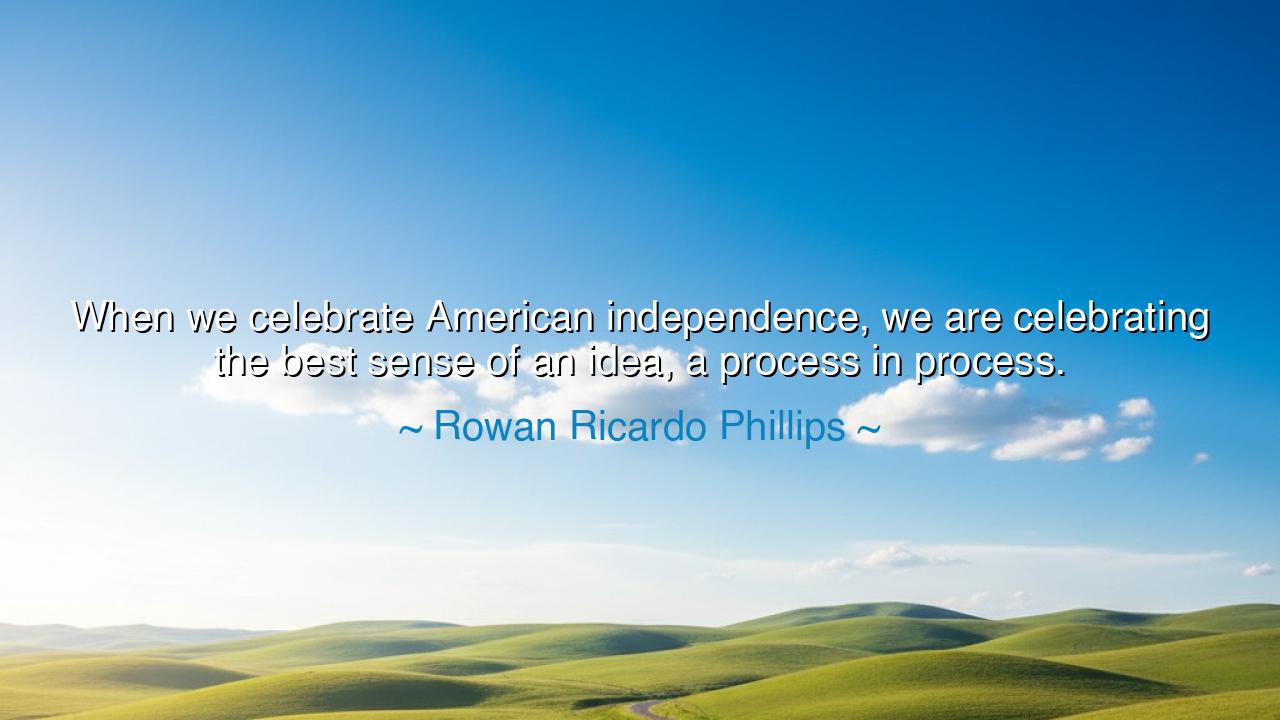
When we celebrate American independence, we are celebrating the
When we celebrate American independence, we are celebrating the best sense of an idea, a process in process.






The words of Rowan Ricardo Phillips, when he said, “When we celebrate American independence, we are celebrating the best sense of an idea, a process in process,” carry a quiet brilliance — the wisdom of one who sees that freedom is not a moment, but a movement. His reflection reminds us that independence is not a fixed point in time, not something accomplished once and for all in the year 1776, but an ever-living, ever-evolving journey. Beneath his words lies the understanding that the founding of America was not merely the birth of a nation, but the birth of an idea — an idea still growing, still tested, still unfinished. When we raise our flags, when we hear the echoes of fireworks and anthems, we are not merely honoring the past; we are acknowledging our duty to the present and the promise of the future.
Phillips, a poet and scholar of the modern age, writes not as a politician but as a philosopher of truth. He reminds us that independence was — and remains — an act of imagination as much as an act of rebellion. The men and women who stood against empire and tyranny in the eighteenth century did not create perfection; they created possibility. They carved out a space for the idea of freedom to live and evolve. What we celebrate, says Phillips, is not a static achievement, but the ongoing work of a people striving to make that idea real. “A process in process” — these words are humble and grand at once, acknowledging that liberty must be tended like a flame, lest it flicker and die.
The origin of this idea reaches back to the moment when the Declaration of Independence was signed — that sacred document that declared not just separation from Britain, but allegiance to a vision: that “all men are created equal.” Yet, as history has shown, those words were not yet true for all who lived under the new flag. Enslaved men and women remained in chains, women were voiceless in law and governance, and Native nations were dispossessed of their lands. And yet, the idea endured. It became the seed that abolitionists, suffragists, and civil rights leaders would one day water with their courage and their sacrifice. In this way, the “process in process” that Phillips speaks of is the unfolding of that idea across centuries — a long struggle to make the promise of freedom whole.
Consider the life of Frederick Douglass, who once asked, “What, to the American slave, is your Fourth of July?” His words were sharp as lightning, spoken not to condemn the dream of independence, but to awaken it. He saw what Phillips later described — that independence was not complete until every person shared in its blessings. Douglass believed that America’s greatness lay not in its perfection, but in its capacity for self-correction — in the moral courage to confront its own contradictions. And so he spoke truth not to destroy, but to refine, reminding a nation that its idea was still a process, still becoming. His defiance, born of suffering, was in fact an act of faith — faith that the idea of freedom could still be redeemed.
Phillips’s words also invite us to reflect on our own role in this unending journey. To celebrate independence, in his view, is not to glorify the past blindly, but to take responsibility for the present. The “idea” that America represents — liberty, equality, and justice — is not self-sustaining. It depends upon each generation to reimagine it, to challenge it, to protect it. When we call ourselves free, we must ask: free for what? For greed and division, or for compassion and progress? The process of independence is not merely about maintaining sovereignty; it is about deepening humanity. It is the work of conscience, of courage, of collective awakening.
In this sense, Phillips’s quote is both celebration and warning. It tells us that the founding of America was not the end of a revolution but its beginning. Independence, he reminds us, is like a river — always moving, never finished. It must be renewed through justice, through truth, through the widening of rights and the recognition of every soul’s dignity. The true spirit of independence is not found in power or wealth, but in the continual striving to live up to our ideals — to make freedom real not just for ourselves, but for all.
So, O listener, let this be your understanding: when you celebrate independence, do so not as one who worships a completed monument, but as one who tends a living fire. Be part of the process in process. Seek truth even when it challenges comfort; defend justice even when it costs you ease. Remember that the truest patriot is not the one who boasts of the nation’s greatness, but the one who helps it grow greater still.
Thus, the wisdom of Rowan Ricardo Phillips endures: that the idea of independence is not frozen in the past, but breathing in every moment of our striving. To celebrate it is to pledge yourself again to the work — the endless, sacred work — of freedom. For the dream of America, like all noble dreams, is not a destination, but a direction. It is a journey of the heart — a process still unfolding, still alive, and still calling each of us to walk in its light.






AAdministratorAdministrator
Welcome, honored guests. Please leave a comment, we will respond soon